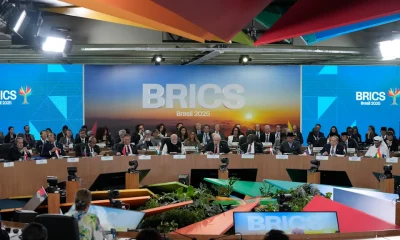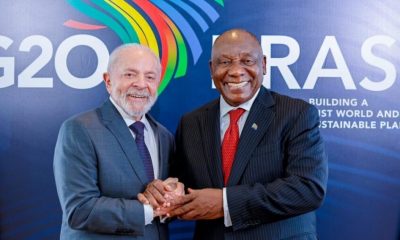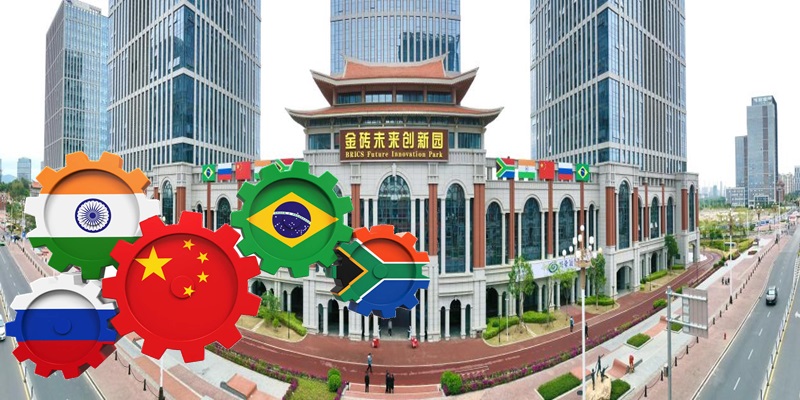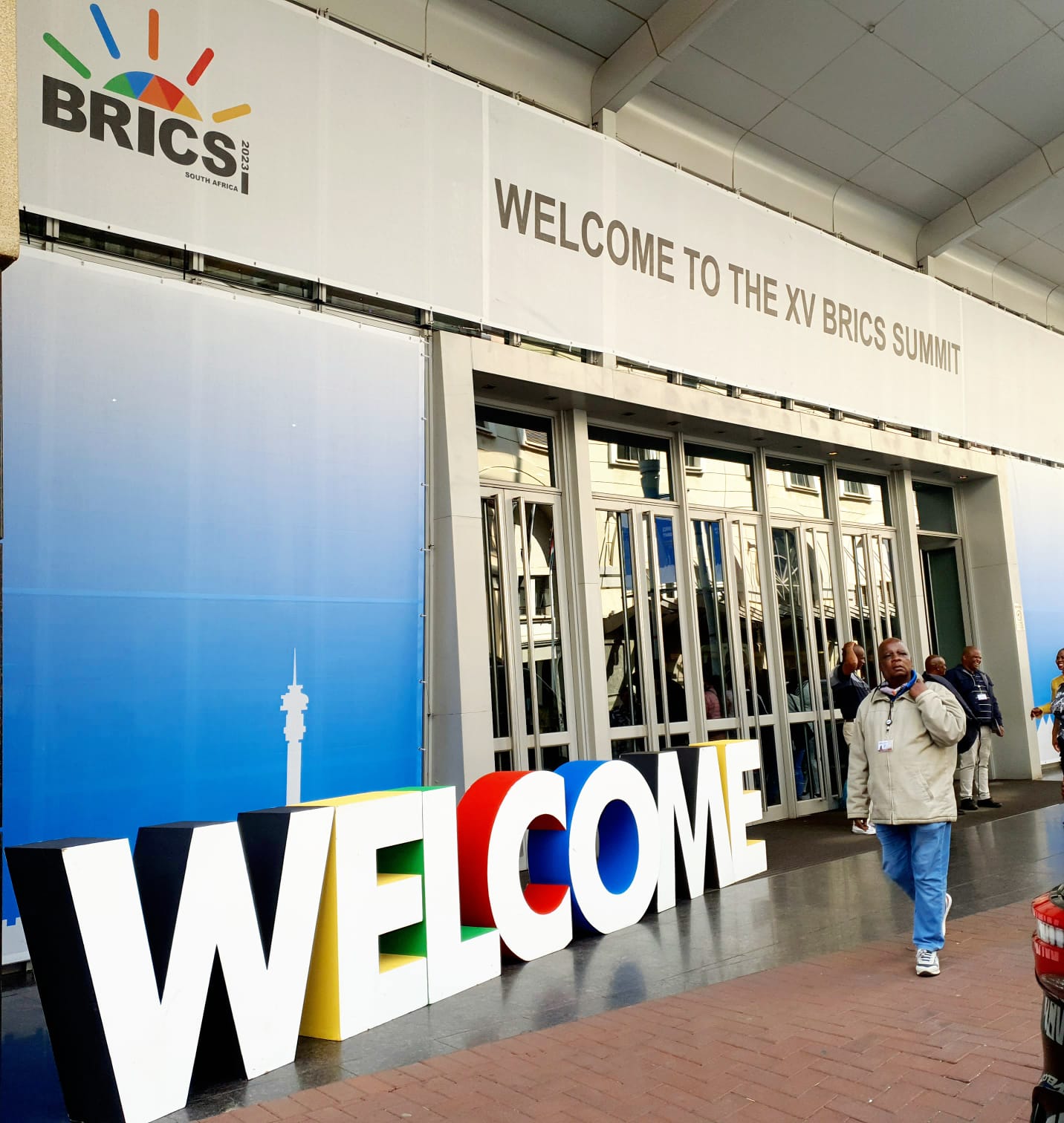Feature/OPED
New World Order, BRICS and Nigeria
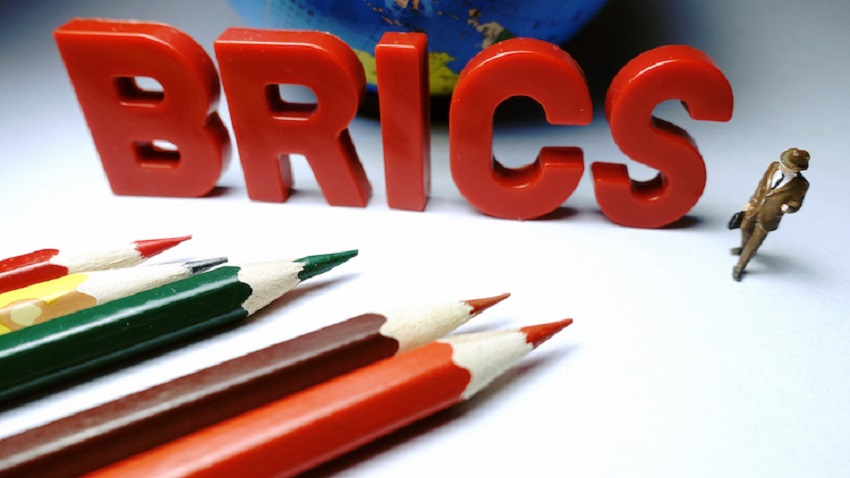
By Jerome-Mario Chijioke Utomi
It is pedestrian information that the BRICS economic bloc, one of the leading global voices for more representation of the developing world and the Global South in world affairs, ended a historic three-day summit in South Africa where it addressed a large set of socioeconomic issues pertinent to the members of the group in the presence of interested foreign representatives and organizations as well as announced to the watching world that six countries are set to join the group in 2024: Iran, Saudi Arabia, the United Arab Emirates, Argentina, Egypt and Ethiopia.
The summit was themed “BRICS and Africa: Partnership for Mutually Accelerated Growth, Sustainable Development and Inclusive Multilateralism”.
To better understand the piece, BRICS is an acronym that started as BRIC in 2001, coined by Jim O’Neill (a Goldman Sachs economist) for Brazil, China, India, and Russia. Later, in 2010, South Africa was added to become BRICS. Goldman Sachs claimed that the four BRIC economies will dominate the global economy by 2050. The main reason for such a claim was that China, India, Brazil, Russia, and South Africa were ranked among the world’s fastest-growing and emerging market economies for years. The main comparative advantage of this group is their low labour costs, favourable demographics, and abundant natural resources during the global commodities boom.
Essentially, while Nigerians lament this deplorable inability of Nigeria to make the list, Vice President Kashim Shettima, contrary to expectation, reportedly stated that the country never applied for BRICS membership.
“So far, we have not applied for the membership of BRICS. And it is majorly informed by the fact that my principal, President Bola Ahmed Tinubu, is a true democrat that believes in consensus building,” “There are so many variables that need to be taken into cognizance. We have to evaluate so many tendencies and issues that require engagements with the economic advisory council, the Federal Executive Council, and even the National Assembly before an informed decision towards joining the BRICS would be taken’’.
Peripherally, the Vice President’s claim appears acceptable. However, the argument may not hold water when faced with embarrassing arguments. Take as an illustration, it was in the news that South African Foreign Minister Naledi Pandor, In early March, said that worldwide interest in the BRICS group was “huge.”
She further told television interviewers that she had 12 letters from interested countries on her desk’ “Saudi Arabia is one,” she said, adding that, “United Arab Emirates, Egypt, Algeria, and Argentina”, as well as Mexico and Nigeria.”
The crucial concern here is how do we reconcile the varying and conflicting claims discussed by Naledi Pandor and Nigeria’s Vice President?
Away from Naledi Pandor’s revelations, Nigerians with critical minds believe that the non-admission of Nigeria into BRICS is largely a sure sign of Nigeria’s battered economy and a manifestation of the current administration’s disrespect for healthy economic policies that could bring the nation’s economy out of the wood.
‘With malice to none but charity to all, this piece believed and still believes that there exists no reason as to why a serious body like BRICS would admit as a member, a nation that its economy under immediate past administration suffered brink of collapse with two consecutive recessions. Also, a reality to worry about is the fact that those negative policies that landed the nation in recession in the past are today embodied by the current administration’s anti-human economic policies characterized by protracted inabilities to stabilize the currency, the economy or grow the nation’s Gross Domestic Product (GDP).
Undoubtedly, looking at the BRICS growth potentials, the sustainability of their rise, and the impact they have already created on the environment of member nations, no one can describe as groundless the deep concern expressed by well-meaning Nigerians over the country’s failure to get enlisted as a member of the body.
Aside from the awareness that right from October 1, 1960, when Nigeria got her independence, it has related with the West with little or nothing to show for the relationship other than huge economic burden, infrastructural deficit and security challenges, there exists the other hands, hopeful signs, and possibility of economic growth and sociopolitical re-engineering if Nigeria joins BRICS.
For instance, reports have it that the cooperation among BRICS-member nations so far serves the common interests of the developing countries as well as the emerging market economies of member states. Also alluring is the awareness that cooperation and dialogue among the BRIC countries have also assisted the world’s harmony, peace and shared prosperity.
That is not the only benefit.
Viewed broadly, according to reports, BRICS countries from 2009 to 2014 agreed on economic and financial issues, including World Bank and IMF reforms. They agreed to undertake measures of mobilizing sufficient resources so that the IMF can strengthen its potential to combat all kinds of crises. They also created the BRICS Interbank Cooperation Mechanism, which provides an Extending Credit Facility in Local Currency, and the BRICS Exchanges Alliance.
In the same vein, the BRICS nation, it was reported, offered a source of foreign expansion for firms and solid returns for institutional investors. They also focused on some regional issues, including the problems related to Libya, Syria, Afghanistan and Iran (their indigenous nuclear program), and coordinated together in resolving Conflicts, IMF reforms, the struggle against illicit drug trafficking, the need, use, and development of technologies in information and communication.
Also interesting is the awareness that, unlike other blocs, BRICS partners’ relations are built on the basis of the UN Charter; they follow the recognized principles as well as international law’s norms. All the member countries agreed to the following principles during their 2011 Summit. Those principles were: Openness, Pragmatism, Neutrality (regarding third parties) and Non-bloc nature’.
While this piece insists that joining the bloc remains an opportunity that Nigeria as a country must not miss, I hold the opinion that the country (Nigeria) will continue to suffer rejections in the hands of international organizations as well as face difficulty at home accelerating the economic life cycle of its people until leaders contemplate industrialization, or productive collaboration with private organizations that have surplus capital to create employment.
Therefore, as the debate rages, one point that Nigeria and Africa as a whole must not fail to remember is that from what experts are saying, the current wealth disparity among nations (industrial economies), represented by highly industrialized Europe, North America and Japan on one hand and most developing (non-industrial economies) countries, in particular, those in sub-Saharan Africa, on the order is largely a function of difference in the technical capability and capacity to produce and manufacture modern technologies and to use the technologies to produce and manufacture globally competitive industrial goods and to sustain the commanding tasks of science and technology in the economy.
The disparity, it was noted, has since considerably widened and will continue to widen as long as the developing countries depend almost totally on industrial nations for the technologies and industrial inputs they need to sustain their economies. Consequently, the only way to bridge the wealth gap is for the world’s developing countries to build their domestic endogenous capabilities and capacities to produce modern technologies and competitive industrial goods in their own economies, he concluded.
Catalyzing the process will again necessitate recognition by public office holders in Nigeria that public order, personal and national security, economic and social programmes, and prosperity are not the natural order of things but depend on the ceaseless efforts and attention from an honest and effective government that the people elect. They must collectively recognize that it takes a prolonged effort to administer a country well and change the backward habits of the people.
Nigerians, on their part, must admit that it is time to recover their moral and strategic ‘health’ to demand accountability from their leaders for poor decisions, missed judgment, lack of planning, lack of preparation and wilful denial of the obvious truth about serious and imminent threats that are facing the country.
“The destiny of the ship is not in the harbour but in sailing the high sea’’ and so shall our collective responsibility be not to destroy this great nation but join hands to nurture and sustain it. If we are able to manage this situation and other social menace effectively and navigate out of the dangers of disintegration, it will once again announce the arrival of a brand new great nation where peace, love and new order shall reign supreme.
Utomi is the Program Coordinator (Media and Policy) at Social and Economic Justice Advocacy (SEJA), Lagos. He can be reached via je*********@***oo.com
Feature/OPED
How Christians Can Stay Connected to Their Faith During This Lenten Period

It’s that time of year again, when Christians come together in fasting and prayer. Whether observing the traditional Lent or entering a focused period of reflection, it’s a chance to connect more deeply with God, and for many, this season even sets the tone for the year ahead.
Of course, staying focused isn’t always easy. Life has a way of throwing distractions your way, a nosy neighbour, a bus driver who refuses to give you your change, or that colleague testing your patience. Keeping your peace takes intention, and turning off the noise and staying on course requires an act of devotion.
Fasting is meant to create a quiet space in your life, but if that space isn’t filled with something meaningful, old habits can creep back in. Sustaining that focus requires reinforcement beyond physical gatherings, and one way to do so is to tune in to faith-based programming to remain spiritually aligned throughout the period and beyond.
On GOtv, Christian channels such as Dove TV channel 113, Faith TV and Trace Gospel provide sermons, worship experiences and teachings that echo what is being practised in churches across the country.
From intentional conversations on Faith TV on GOtv channel 110 to true worship on Trace Gospel on channel 47, these channels provide nurturing content rooted in biblical teaching, worship, and life application. Viewers are met with inspiring sermons, reflections on scripture, and worship sessions that help form a rhythm of devotion. During fasting periods, this kind of consistent spiritual input becomes a source of encouragement, helping believers stay anchored in prayer and mindful of God’s presence throughout their daily routines.
To catch all these channels and more, simply subscribe, upgrade, or reconnect by downloading the MyGOtv App or dialling *288#. You can also stream anytime with the GOtv Stream App.
Plus, with the We Got You offer, available until 28th February 2026, subscribers automatically upgrade to the next package at no extra cost, giving you access to more channels this season.
Feature/OPED
Turning Stolen Hardware into a Data Dead-End

By Apu Pavithran
In Johannesburg, the “city of gold,” the most valuable resource being mined isn’t underground; it’s in the pockets of your employees.
With an average of 189 cellphones reported stolen daily in South Africa, Gauteng province has become the hub of a growing enterprise risk landscape.
For IT leaders across the continent, a “lost phone” is rarely a matter of a misplaced device. It is frequently the result of a coordinated “snatch and grab,” where the hardware is incidental, and corporate data is the true objective.
Industry reports show that 68% of company-owned device breaches stem from lost or stolen hardware. In this context, treating mobile security as a “nice-to-have” insurance policy is no longer an option. It must function as an operational control designed for inevitability.
In the City of Gold, Data Is the Real Prize
When a fintech agent’s device vanishes, the $300 handset cost is a rounding error. The real exposure lies in what that device represents: authorised access to enterprise systems, financial tools, customer data, and internal networks.
Attackers typically pursue one of two outcomes: a quick wipe for resale on the secondary market or, far more dangerously, a deep dive into corporate apps to extract liquid assets or sellable data.
Clearly, many organisations operate under the dangerous assumption that default manufacturer security is sufficient. In reality, a PIN or fingerprint is a flimsy barrier if a device is misconfigured or snatched while unlocked. Once an attacker gets in, they aren’t just holding a phone; they are holding the keys to copy data, reset passwords, or even access admin tools.
The risk intensifies when identity-verification systems are tied directly to the compromised device. Multi-Factor Authentication (MFA), widely regarded as a gold standard, can become a vulnerability if the authentication factor and the primary access point reside on the same compromised device. In such cases, the attacker may not just have a phone; they now have a valid digital identity.
The exposure does not end at authentication. It expands with the structure of the modern workforce.
65% of African SMEs and startups now operate distributed teams. The Bring Your Own Device (BYOD) culture has left many IT departments blind to the health of their fleet, as personal devices may be outdated or jailbroken without any easy way to know.
Device theft is not new in Africa. High-profile incidents, including stolen government hardware, reinforce a simple truth: physical loss is inevitable. The real measure of resilience is whether that loss has any residual value. You may not stop the theft. But you can eliminate the reward.
Theft Is Inevitable, Exposure is Not
If theft cannot always be prevented, systems must be designed so that stolen devices yield nothing of consequence. This shift requires structured, automated controls designed to contain risk the moment loss occurs.
Develop an Incident Response Plan (IRP)
The moment a device is reported missing, predefined actions should trigger automatically: access revocation, session termination, credential reset and remote lock or wipe.
However, such technical playbooks are only as fast as the people who trigger them. Employees must be trained as the first line of defence —not just in the use of strong PINs and biometrics, but in the critical culture of immediate reporting. In high-risk environments, containment windows are measured in minutes, not hours.
Audit and Monitor the Fleet Regularly
Control begins with visibility. Without a continuous, comprehensive audit, IT teams are left responding to incidents after damage has occurred.
Opting for tools like Endpoint Detection and Response (EDR) allows IT teams to spot subtle, suspicious activities or unusual access attempts that signal a compromised device.
Review Device Security Policies
Security controls must be enforced at the management layer, not left to user discretion. Encryption, patch updates and screen-lock policies should be mandatory across corporate devices.
In BYOD environments, ownership-aware policies are essential. Corporate data must remain governed by enterprise controls regardless of device ownership.
Decouple Identity from the Device
Legacy SMS-based authentication models introduce avoidable risk when the authentication channel resides on the compromised handset. Stronger identity models, including hardware tokens, reduce this dependency.
At the same time, native anti-theft features introduced by Apple and Google, such as behavioural theft detection and enforced security delays, add valuable defensive layers. These controls should be embedded into enterprise baselines rather than treated as optional enhancements.
When Stolen Hardware Becomes Worthless
With POPIA penalties now reaching up to R10 million or a decade of imprisonment for serious data loss offences, the Information Regulator has made one thing clear: liability is strict, and the financial fallout is absolute. Yet, a PwC survey reveals a staggering gap: only 28% of South African organisations are prioritising proactive security over reactive firefighting.
At the same time, the continent is battling a massive cybersecurity skills shortage. Enterprises simply do not have the boots on the ground to manually patch every vulnerability or chase every “lost” terminal. In this climate, the only viable path is to automate the defence of your data.
Modern mobile device management (MDM) platforms provide this automation layer.
In field operations, “where” is the first indicator of “what.” If a tablet assigned to a Cape Town district suddenly pings on a highway heading out of the city, you don’t need a notification an hour later—you need an immediate response. An effective MDM system offers geofencing capabilities, automatically triggering a remote lock when devices breach predefined zones.
On Supervised iOS and Android Enterprise devices, enforced Factory Reset Protection (FRP) ensures that even after a forced wipe, the device cannot be reactivated without organisational credentials, eliminating resale value.
For BYOD environments, we cannot ignore the fear that corporate oversight equates to a digital invasion of personal lives. However, containerization through managed Work Profiles creates a secure boundary between corporate and personal data. This enables selective wipe capabilities, removing enterprise assets without intruding on personal privacy.
When integrated with identity providers, device posture and user identity can be evaluated together through multi-condition compliance rules. Access can then be granted, restricted, or revoked based on real-time risk signals.
Platforms built around unified endpoint management and identity integration enable this model of control. At Hexnode, this convergence of device governance and identity enforcement forms the foundation of a proactive security mandate. It transforms mobile fleets from distributed risk points into centrally controlled assets.
In high-risk environments, security cannot be passive. The goal is not recovery. It is irrelevant, ensuring that once a device leaves authorised hands, it holds no data, no identity leverage, and no operational value.
Apu Pavithran is the CEO and founder of Hexnode
Feature/OPED
Daniel Koussou Highlights Self-Awareness as Key to Business Success

By Adedapo Adesanya
At a time when young entrepreneurs are reshaping global industries—including the traditionally capital-intensive oil and gas sector—Ambassador Daniel Koussou has emerged as a compelling example of how resilience, strategic foresight, and disciplined execution can transform modest beginnings into a thriving business conglomerate.
Koussou, who is the chairman of the Nigeria Chapter of the International Human Rights Observatory-Africa (IHRO-Africa), currently heads the Committee on Economic Diplomacy, Trade and Investment for the forum’s Nigeria chapter. He is one of the young entrepreneurs instilling a culture of nation-building and leadership dynamics that are key to the nation’s transformation in the new millennium.
The entrepreneurial landscape in Nigeria is rapidly evolving, with leaders like Koussou paving the way for innovation and growth, and changing the face of the global business climate. Being enthusiastic about entrepreneurship, Koussou notes that “the best thing that can happen to any entrepreneur is to start chasing their dreams as early as possible. One of the first things I realised in life is self-awareness. If you want to connect the dots, you must start early and know your purpose.”
Successful business people are passionate about their business and stubbornly driven to succeed. Koussou stresses the importance of persistence and resilience. He says he realised early that he had a ‘calling’ and pursued it with all his strength, “working long weekends and into the night, giving up all but necessary expenditures, and pressing on through severe setbacks.”
However, he clarifies that what accounted for an early success is not just tenacity but also the ability to adapt, to recognise and respond to rapidly changing markets and unexpected events.
Ambassador Koussou is the CEO of Dau-O GIK Oil and Gas Limited, an indigenous oil and natural gas company with a global outlook, delivering solutions that power industries, strengthen communities, and fuel progress. The firm’s operations span exploration, production, refining, and distribution.
Recognising the value of strategic alliances, Koussou partners with business like-minds, a move that significantly bolsters Dau-O GIK’s credibility and capacity in the oil industry. This partnership exemplifies the importance of building strong networks and collaborations.
The astute businessman, who was recently nominated by the African Union’s Agenda 2063 as AU Special Envoy on Oil and Gas (Continental), admonishes young entrepreneurs to be disciplined and firm in their decision-making, a quality he attributed to his success as a player in the oil and gas sector. By embracing opportunities, building strong partnerships, and maintaining a commitment to excellence, Koussou has not only achieved personal success but has also set a benchmark for future generations of African entrepreneurs.
His journey serves as a powerful reminder that with determination and vision, success is within reach.
-

 Feature/OPED6 years ago
Feature/OPED6 years agoDavos was Different this year
-
Travel/Tourism10 years ago
Lagos Seals Western Lodge Hotel In Ikorodu
-

 Showbiz3 years ago
Showbiz3 years agoEstranged Lover Releases Videos of Empress Njamah Bathing
-

 Banking8 years ago
Banking8 years agoSort Codes of GTBank Branches in Nigeria
-

 Economy3 years ago
Economy3 years agoSubsidy Removal: CNG at N130 Per Litre Cheaper Than Petrol—IPMAN
-

 Banking3 years ago
Banking3 years agoSort Codes of UBA Branches in Nigeria
-

 Banking3 years ago
Banking3 years agoFirst Bank Announces Planned Downtime
-

 Sports3 years ago
Sports3 years agoHighest Paid Nigerian Footballer – How Much Do Nigerian Footballers Earn




